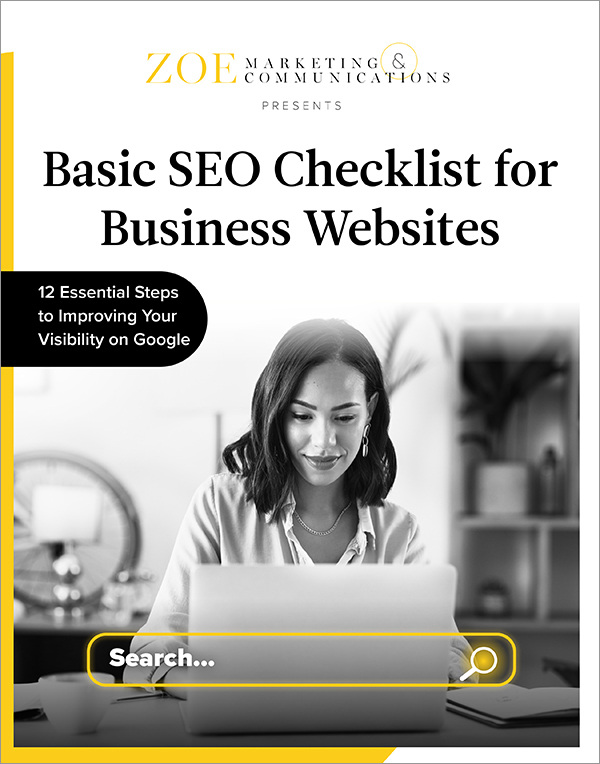
Download Your Basic SEO Checklist
Unlock the fundamentals of search engine optimization. This checklist provides step-by-step guidance to improve your site’s search ranking.
March 26th, 2024 | 2 min. read
By Kim Kovelle

Word of mouth has always been a trusted marketing method. People believe in recommendations from friends and family.
But relying solely on word-of-mouth marketing is risky. While it works well for some businesses, it can’t support consistent, scalable growth on its own.
At Zoe Marketing & Communications, we’ve seen how businesses can benefit from word of mouth — but also how it can backfire if you don’t have other strategies in place.
Here’s a closer look at the pros and cons.
Unlock the fundamentals of search engine optimization. This checklist provides step-by-step guidance to improve your site’s search ranking.

![]() Word of mouth is powerful because it’s based on trust. Nielsen's Consumer Trust Index reports that 92% of people trust recommendations from people they know. Some benefits, according to Invesp:
Word of mouth is powerful because it’s based on trust. Nielsen's Consumer Trust Index reports that 92% of people trust recommendations from people they know. Some benefits, according to Invesp:
That said, relying on word-of-mouth marketing alone can create real challenges.
 5 disadvantages of word-of-mouth marketing
5 disadvantages of word-of-mouth marketingLet's pivot to a few ways word of mouth comes up short. For all its good, relying solely on traditional word of mouth can have several distinct challenges.
Over the years, local businesses have told us, “I don’t need to do marketing. I have great word of mouth.” That works, until it doesn’t.
The trend may last for a while, but things can change quickly, like it did during the pandemic.
Why it matters: Multiple referral sources help protect your business from unexpected shifts.
Word of mouth is like a game of “telephone” — details can get lost or distorted. With the grapevine method, you have far less control over the message.
Digital marketing helps you tailor your message through ads and landing pages, creating clarity for your prospects.
Why it matters: Clear, consistent messaging builds trust and reduces confusion.
With word of mouth, you can’t control who hears your message or how they act.
Someone might rave about a lawn service, but if they skip mentioning price, it could be out of their friend’s budget. Some prospects will pan out, but inevitably, others won’t.
Digital marketing solves this by focusing your message on the right people based on location, interests or income.
Why it matters: Targeting the right audience improves your chances of turning prospects into customers.
How much of your business came from word of mouth last year? Or last month? Tracking is tricky and often anecdotal. You might get some insight if clients fill out a form about where they heard of you, but it’s incomplete.
Digital marketing offers trackable, measurable data that’s far more reliable.
Why it matters: Clear data helps you make smarter decisions and improve your marketing efforts.
Not all word-of-mouth marketing is positive. Negative reviews on digital platforms like Google Business Profile or Yelp can be especially damaging.
Positive referrals boost your business, but bad reviews — without a strong digital presence to balance them — can give potential customers pause.
Why it matters: A strong digital presence helps you control your narrative and build trust.
 The growing role of digital word of mouth
The growing role of digital word of mouthWord of mouth has gone digital. Social media shoutouts and online reviews now amplify traditional efforts. To build trust, expand reach and boost SEO, tap into:
Word of mouth is valuable, but it works best when combined with other marketing strategies.
Ready to take your marketing to the next level? Talk to us at Zoe Marketing & Communications. We’ll help you combine word of mouth with scalable marketing tactics to meet your business goals.
Still researching? Get a boost with these tips:

Unlock the fundamentals of search engine optimization. This checklist provides step-by-step guidance to improve your site’s search ranking.
As Zoe Marketing & Communications’ content manager, Kim Kovelle brings over 20 years of writing and editing experience in metro Detroit. She has strong roots in community journalism and a knack for making complicated topics make more sense.
